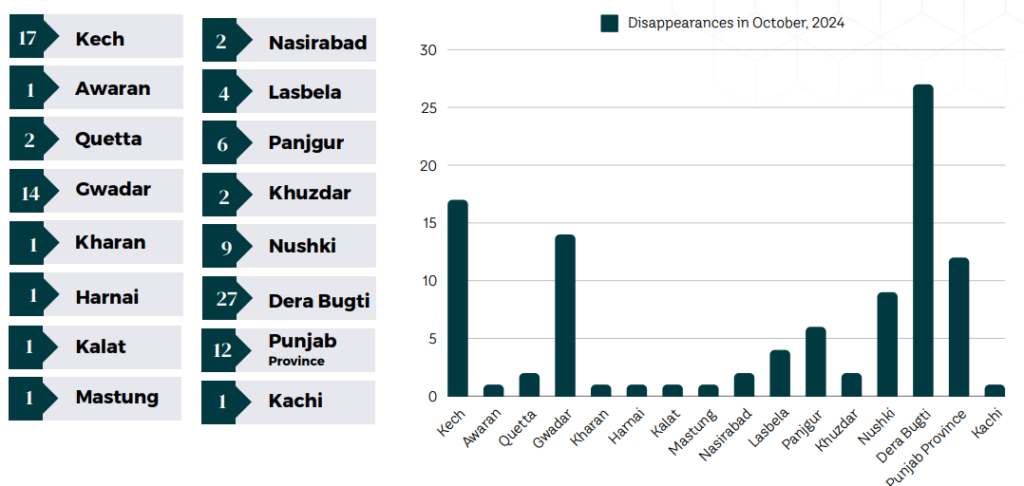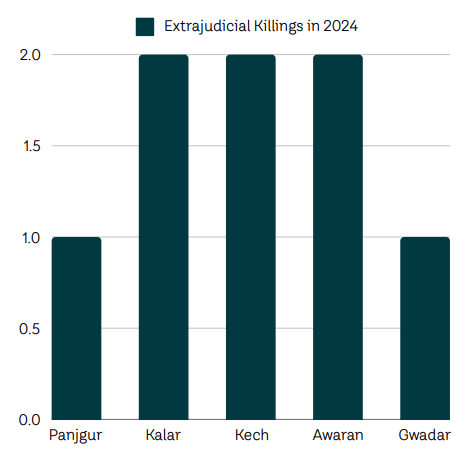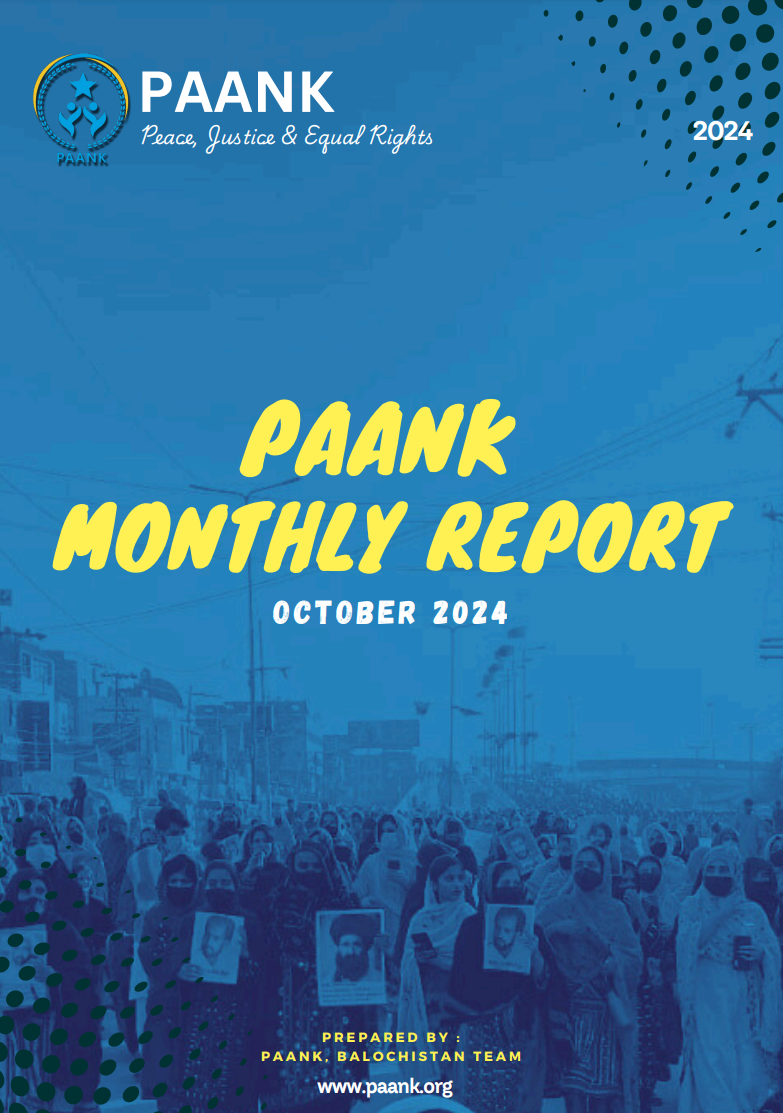Incidents of Enforced Disappearances
In Balochistan, enforced disappearances of Baloch citizens in various cities within Balochistan and Pakistan continue to be carried out by the Pakistan Army and affiliated agencies. Raids on institutions, homes, and business centres result in abductions with increasing frequency.
The Pakistan Army operates with bold impunity, evading accountability. For Baloch citizens, rights guaranteed under international human rights laws and even state laws remain only on paper.
Pakistani courts appear ineffective on the issue of enforced disappearances, while the government and civil authorities seem to support the Army’s actions. International organizations stand as the primary hope for justice, holding the potential to pressure Pakistan to halt its human rights abuses.
In October 2024, cases of enforced disappearances of Baloch citizens were reported from 14 districts across Balochistan, including Karachi and Punjab. Dera Bugti district saw the highest incidence, with 27 enforced disappearances. State agencies forcibly detained 110 people across Balochistan, predominantly targeting students.
Extrajudicial Killings
The Pakistan Army engages in extrajudicial killings, directly and indirectly, to evade legal repercussions and possible public backlash. According to the Army’s notorious “kill-and-dump” policy, detailed in the secretive ‘Operation Silence’, thousands of Baloch individuals have been extrajudicially executed following enforced disappearances, with their bodies later abandoned.
In regions where the military takes an active stance in political conflicts, the rule of law dissolves, and state institutions succumb to systemic lawlessness. In Balochistan, the Pakistan military positions itself against the Baloch National Liberation Movement, often responding to insurgent attacks by targeting innocent civilians to instil widespread fear through collective punishment.
Supporting the military’s agenda are criminal collaborators who, with the military’s assistance, form death squads. These squads operate to uphold the Pakistan Army’s political, military, and economic interests, often rewarded with immunity from criminal charges, including theft, robbery, drug trafficking, and extortion.
In October 2024, the Pakistan Army and affiliated death squads killed several individuals across Balochistan. Below are the details:
October 1: Pir Jan, son of Aslam residents of Prom, was shot dead by death squad operatives in Panjgur’s main market.
October 6: Death squads killed Altaf, son of Sayed Muhammad residents of Gili , in Buledah Tehsil, Kech District.
October 21: Two individuals, Abdul Haq (son of Jangi Khan Muhammad Hasani) and Liaqat (son of Neeksal), were killed by death squads in Mashkai Bazar, Awaran District.
October 23: In Kalat District, Pakistani forces raided the home of Muhammad Ali Langove at night, killing him and forcibly disappearing his son.
October 26: In Jimuri, Gwadar District, drug traffickers, operating with the support of Pakistani forces, killed Abdul Basit in a personal dispute.
October 26: In Menaz, Buledah Tehsil, Kech District, a security guard at UBL Bank, was fatally shot during an incident.
Escalation of Military Aggression Across Balochistan
In October 2024, the Pakistan Army escalated its ground and air actions in various regions of Balochistan, notably in Kech, Barkhan, and Dera Bugti. Dera Bugti bore the brunt of this aggression, where the Pakistan army, alongside members of the ‘Aman Force’ death squad led by Sarfaraz Bugti, the socalled Chief Minister of Balochistan, targeted civilian areas. These raids resulted in injuries, abductions, and widespread fear among the local population, including the kidnapping of a Levies Force SHO.
Ongoing military aggressions have forced many families to migrate from Dera Bugti, with homes destroyed, properties damaged, and numerous enforced disappearances reported. Since Sarfaraz Bugti, an ally of the Pakistan Army, took office as Interior Minister and now Chief Minister, cases of enforced disappearances and extrajudicial killings have surged.
Several civilians, including women and children, were injured in the recent aggressions:
- Shah Khatun, wife of Shabbir Bugti, age 50
- Hawa Bibi, wife of Mir Ali Bugti, age 35
- Shah Naz, daughter of Shabbir Bugti, age 16
- Jamal, son of Mir Ali Bugti, age 8
- Shah Hussain, son of Mir Ali Bugti
- Fatima, wife of Siddiq Bugti, age 60
- Siddiq Bugti
- Alam Khan, son of Siddiq Bugti
During the aggression, mortar shells were fired at homes, leading to extensive property damage and fires. The following residents’ houses were completely destroyed:
- Nabi Bakhsh Bugti
- Wadera Noor Ali Bugti
- Mir Baig Bugti
- Hazaro Bugti
- Siddiq Bugti
More than fifty livestock were killed in the shelling by Pakistani helicopters. Affected individuals include Nabi Bakhsh Bugti, Shahnawaz Bugti, Ganju Bugti, and Shah Jamal Bugti.
Over 27 people forcibly disappeared, including SHO Tariq Bugti, son of Gul Gahanwar Bugti, from the Levies Force.
In Marave, Dera Bugti, the Pakistan Armt raided Barkat Bugti’s home, forcibly disappearing him. Female residents were subjected to severe torture, and valuables, including jewellery and cash, were looted.
Violence and Arrests of Protesters Condemning Human Rights Violations Outside Karachi Press Club
The Pakistani army is not only implicated in serious crimes like enforced disappearances and extrajudicial killings in Balochistan but also actively suppresses voices raised against these abuses through force. Under its orders, Pakistani intelligence agencies and police conduct crackdowns on peaceful protesters.
On the evening of October 16, 2024, Pakistani intelligence agencies, in coordination with the police, raided Bashir Village in Dalmia Gulshane-Iqbal, Karachi, and forcibly disappeared a dozen students from Balochistan.
In response, the Baloch Yakjehti Committee called for protests across Balochistan and Karachi. A protest rally was held from the Arts Council to Karachi Press Club on October 26, 2024. To prevent protesters from reaching the Press Club, Karachi Police and plainclothes military intelligence personnel erected barricades. The peaceful protesters were subjected to violence, and several were detained, including Lala Wahab Baloch, deputy organizer of the Baloch Yakjehti Committee, who was later released by court order.
Statistics of Enforced Disappearances
The following districts reported cases of enforced disappearances and illegal detentions in October 2024:

Analysis of Enforced Disappearances in October 2024
In October 2024, cases of enforced disappearances were reported across 16 districts, affecting both Balochistan and parts of Punjab. A total of 110 disappearances were documented, with Dera Bugti reporting the highest number at 27 cases, followed by Kech with 17 cases and Gwadar with 14 cases.
This data indicates a concerning trend, with an average of approximately 3.5 enforced disappearances per day in October. This figure underscores the scale of the human rights crisis in Balochistan, where targeted disappearances continue unabated across multiple regions, reflecting a systematic pattern of state-led oppression and intimidation.
Extrajudicial Killings October 2024
In October 2024, six extrajudicial killings were reported across the Balochistan districts of Awaran, Kalat, Panjgur, Kech, and Gwadar. These incidents carried out by the Pakistan Army and affiliated death squads, reflect a disturbing pattern of targeted violence in the region:

- Panjgur: Death squad operatives carried out a targeted killing in the district’s main market
- Kech: A killing was reported in Buledah Tehsil, perpetrated by death squads
- Awaran: Death squads were reportedly responsible for multiple killings in Mashkai Bazar.
- Kalat: Pakistani forces conducted a night raid, resulting in a fatality and an enforced disappearance.
- Gwadar: A killing occurred in Jimuri, reportedly involving drug traffickers with the support of Pakistani forces
These incidents underscore the ongoing human rights crisis in Balochistan, where extrajudicial actions continue to instill fear and erode the safety of local communities.
Analysis and Key Findings
The October 2024 report on the human rights situation in Balochistan presents a grim and alarming picture of escalating violence, state-sponsored oppression, and systematic human rights violations perpetrated against the Baloch population. The report highlights key issues including enforced disappearances, extrajudicial killings, and military aggression, each contributing to the ongoing crisis in the region.
Enforced Disappearances
The continued disappearances of Baloch people, including students, reveal a pattern of state-sponsored abductions carried out with impunity by the Pakistan Army and affiliated agencies. Despite the widespread international condemnation, Pakistani authorities remain largely unaccountable for these actions, and local courts appear ineffective in addressing these violations. The targeting of students points to a deliberate attempt to suppress dissent and stifle the future of Baloch youth.
Extrajudicial Killings
The use of death squads, often in collaboration with the military, to execute extrajudicial killings serves as a method of state control and punishment. These killings are presented as part of a broader strategy to undermine the Baloch National Liberation Movement and intimidate the civilian population. The “killand-dump” policy, under which Baloch individuals are executed and discarded, shows the extreme measures taken by the state to eliminate opposition without facing legal repercussions.
Military Aggression
The escalation of military operations in Balochistan, particularly in Dera Bugti, Kech, and Barkhan, reflects a strategy of collective punishment aimed at suppressing resistance and instilling fear among the local population. Sarfaraz Bugti, the current Chief Minister of Balochistan and a puppet of the Pakistani Army, plays a central role in this campaign. His involvement, alongside state-supported death squads, has intensified human rights violations in the region. This aggression has led to widespread displacement, property destruction, and civilian casualties, further worsening the humanitarian crisis in Balochistan.
Suppression of Protests
The suppression of peaceful protests in Karachi highlights the government’s disregard for basic civil liberties. The crackdown on the Baloch Yakjehti Committee’s peaceful demonstration outside the Karachi Press Club, where protesters were detained and subjected to violence, underlines the regime’s determination to silence any form of dissent and to prevent the public from calling attention to human rights abuses.
Conclusion
The October 2024 report paints a grim picture of the ongoing human rights violations in Balochistan, where the Pakistan Army, in conjunction with allied death squads and state intelligence agencies, continues to oppress the Baloch population through enforced disappearances, extrajudicial killings, and military aggression. The government’s actions not only violate international human rights standards but also reveal a systemic effort to suppress political opposition and instill fear. The targeted attacks on civilians and suppression of peaceful protests underscore the urgent need for international intervention and accountability to address the ongoing crisis in Balochistan.
For the Baloch people, the situation remains dire, with increasing numbers of families being displaced, abducted, and killed. The international community must continue to demand justice and hold the Pakistani state accountable for its actions, while supporting the right of the Baloch people to selfdetermination and a peaceful existence free from oppression.

